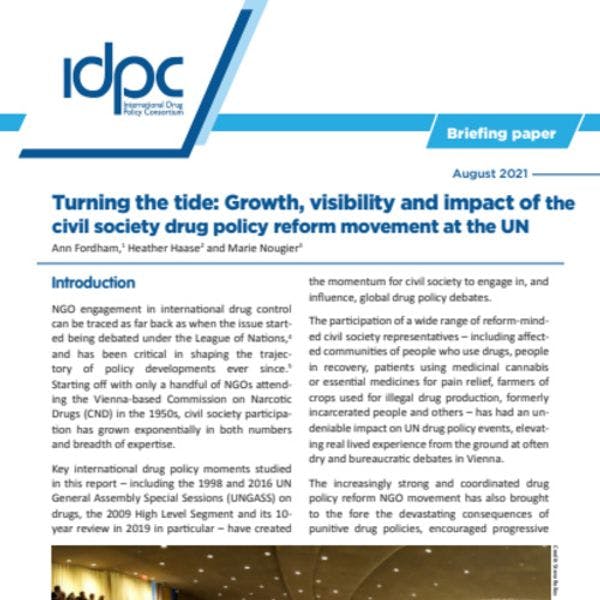Croissance, visibilité et impact du mouvement de la société civile pour la réforme des politiques en matière de drogues aux Nations Unies
L’IDPC présente une analyse historique du plaidoyer de la société civile pour la réforme des politiques des drogues aux Nations Unies, en évaluant les gains, les défis et la manière dont ces derniers ont été généralement surmontés. Pour en savoir plus, en anglais, veuillez lire les informations ci-dessous.
By Ann Fordham, Heather Haase and Marie Nougier
NGO engagement in international drug control can be traced as far back as when the issue started being debated under the League of Nations, and has been critical in shaping the trajectory of policy developments ever since. Starting off with only a handful of NGOs attending the Vienna-based Commission on Narcotic Drugs (CND) in the 1950s, civil society participation has grown exponentially in both numbers and breadth of expertise.
Key international drug policy moments studied in this report – including the 1998 and 2016 UN General Assembly Special Sessions (UNGASS) on drugs, the 2009 High Level Segment and its 10year review in 2019 in particular – have created the momentum for civil society to engage in, and influence, global drug policy debates.
The participation of a wide range of reform-minded civil society representatives – including affected communities of people who use drugs, people in recovery, patients using medicinal cannabis or essential medicines for pain relief, farmers of crops used for illegal drug production, formerly incarcerated people and others – has had an undeniable impact on UN drug policy events, elevating real lived experience from the ground at often dry and bureaucratic debates in Vienna.
The increasingly strong and coordinated drug policy reform NGO movement has also brought to the fore the devastating consequences of punitive drug policies, encouraged progressive governments to join forces in calls for reform, and supported non-Vienna-based UN agencies to engage in drug policy discussions. This has largely contributed to the increased attention given to the health, human rights and developmental implications of drug control, culminating with the 2016 UNGASS and its Outcome Document, and the adoption of the UN System Common Position on drugs by the heads of 31 UN agencies in 2018.
Reform NGOs have nonetheless faced many challenges along the way. These have included the clearly limited impact made by civil society when using ‘official’ channels of participation, ongoing resistance from both UN entities and governments which are hampering their involvement in UN drug policy debates, and increasingly restricted civil society space, in particular in the context of the COVID-19 pandemic.
This briefing paper offers a historical analysis of civil society advocacy for drug policy reform at the UN, assessing the many gains made and challenges encountered over time – and ways in which reform-oriented civil society has met, resisted, and generally overcome, these challenges. This paper is based on desk research, discussions with advocates involved in the key events discussed in the paper, and the lived experiences of the authors, and so is naturally weighted more to the recent moments such as Beyond 2008, the 2016 UNGASS, the 2019 Ministerial Segment, and the advent of the COVID-19 pandemic.
